<Back to Index>
- Field Marshal of the British Army Henry Maitland Wilson, 1881
- Generaloberst of the Waffen-SS Josef "Sepp" Dietrich, 1892
PAGE SPONSOR
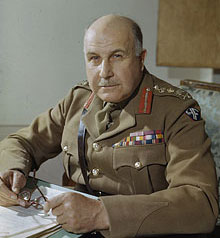
Field Marshal Henry Maitland Wilson, 1st Baron Wilson, GCB, GBE, DSO (5 September 1881 – 31 December 1964), also known as "Jumbo" Wilson, saw active service in the Second Boer War and First World War, and became a senior British general in the Middle East and Mediterranean during the Second World War. Described as "sound but not spectacular" he enjoyed the confidence of Winston Churchill.
Wilson was the eldest son of the Suffolk landowner Capt Arthur Maitland Wilson, and his wife, Harriet Kingscote, a descendant of the 1st Earl Howe. Lieutenant General Sir Henry Fuller Maitland Wilson (1859 – 1941), who commanded XII Corps during World War I, was his uncle. Wilson was educated at Eton College and after attending Sandhurst was commissioned into the Rifle Brigade as a 2nd lieutenant in March 1900, and served in South Africa in the Second Boer War, for which he was awarded the Queen's and King's South Africa Medal each with two clasps.
Promoted to captain in 1908 he served in Ireland, and in 1911 became Adjutant of the Oxford OTC. In October 1914 he was appointed Brigade Major of 48th Brigade in 16th Irish division, with which he was sent to France in December 1915. His capabilities as a staff officer led to him being moved to become GSO 2 of the 41st Division on the Somme and of the XIX Corps at Passchendaele. In October 1917 he was appointed GSO 1 of the New Zealand Division. For his war service he was awarded the DSO in 1917 and was thrice mentioned in dispatches.
After being hand picked for the first post war staff course at Camberley, and a spell at Sandhurst, he returned to his own regiment. He then spent 3 years as chief umpire to the second division under General Philip Chetwode which greatly progressed his professional development. Next he took command of his regiment's first battalion and spent three years on the North - West Frontier. Here he spent time cultivating the tribesmen as well as indulging in his enjoyment of field sports.
Returning in the 1930s to be an instructor at Camberley, he had some periods on half pay. He was involved with the development of motorized infantry working with armored forces, which led to the concept of the motor battalion. He was appointed Commander 6th Infantry Brigade in 1934 and General Officer Commanding 2nd Division in 1937.
In June 1939, Wilson was appointed General Officer Commanding (GOC) British Troops in Egypt, and he was also responsible for giving military advice for a range of countries from Abyssinia to the Persian Gulf. He made his HQ in Cairo and undertook successful negotiations with the Egyptian government at their summer quarters in Alexandria. The Treaty of 1936 called for the Egyptian army to fight under British command in the event of war and to supplement the limited force then at his disposal — an armored division then being formed (later to be the 7th Armored Division) and eight British battalions. He concentrated his defensive forces at Mersa Matruh some 100 miles from the border with Libya.
Early in August, General Archibald Wavell was appointed Commander - in - Chief of the Middle East Command, and he sent reinforcements which had been sought by Wilson, initially the Indian 4th Infantry Division and advanced elements of 6th Australian Division and, as the build up at Mersa Matruh continued, Richard O'Connor and his staff at 7th Infantry Division in Palestine were moved to Egypt to reinforce Wilson's command structure there. O'Connor's HQ, initially designated British 6th Infantry Division, was activated in November and became responsible for the troops at Mersa Matruh. It was re-designated Western Desert Force in June 1940.
When the war started, both Egypt and Italy unexpectedly declared non - belligerency. With fierce radio propaganda in the winter of 1939 the Germans sought to turn the Egyptians against the British. Wilson was responsible for securing the continued cooperation of the Egyptian leaders with his defensive build up as he concentrated on building roads to supply his forward positions.
On 10 June 1940, Italian dictator Benito Mussolini declared war. Immediately Wilson's forces invaded Libya. However, their advance was reversed when on 17 June France sought an armistice and the Italians where able to move their forces from the Tunisian border in the West and reinforce with 4 divisions those that opposed Wilson in the East. The Italian forces invaded Egypt in September 1940, and advanced some 60 miles (97 km) to occupy Sidi Barrani. Wilson was facing very superior forces. He had 31,000 troops to the Italians' 80,000, 120 tanks against 275, and 120 artillery pieces against 250. He realized that the situation was one where the traditional text books would not provide a solution. As with other 1940s commanders he had been well schooled in the strategy of the campaigns of Lee and Stonewall Jackson in Virginia, and with his field commanders, in particular O'Connor, and in thorough secrecy, he planned to disrupt the advance of the superior forces by attacking their extended lines at the right spots. After a conference with Eden and Wavell in October and rejecting Wavell's suggestion for a two - pronged attack, Wilson launched Operation Compass on 7 December 1940. The strategy was outstandingly successful and very quickly the Italian forces were cut in half.
Wilson oversaw the first stages of the campaign during which the British Army secured its first field victories of the war and advanced to the border with Libya. Wilson was able to deploy highly mobile motorized infantry in conjunction with armor which he had helped develop in the 1930s. This first land success was used by Churchill to boost home morale, and Wilson was awarded the K.C.B.
After the capture of Tobruk, Wilson was recalled to Cairo where he was offered and accepted the position of Military Governor of Cyrenaica. On 22 February 1941 within a few days of taking up this duty, he met with Wavell, Eden and Dill who were seeking a senior commander to lead reinforcements to Greece.
While Operation Compass continued successfully in 1941 and resulted in the complete defeat of the Italian Army in North Africa, Wilson, who was already highly regarded by his World War I regimental colleague and now Secretary of State for War, Anthony Eden, had also won the confidence of Churchill himself. In a broadcast Churchill said, "General Wilson, who commands the Army of the Nile, was reputed to be one of our finest tacticians, and few will now deny him that quality."
Wilson was appointed to lead a Commonwealth expeditionary force of two infantry divisions and an armored brigade to help Greece resist Italy and the subsequent German invasion in April 1941. Although the Allied forces were hopelessly inadequate Churchill's War Cabinet had thought it important to provide support for the only country outside the Commonwealth which was resisting the Axis advance. Unsurprisingly, Wilson was forced to make a tactical withdrawal to Crete.
In May 1941, on his return from Greece, Wilson was appointed GOC Palestine and Trans Jordan and oversaw the successful Syria - Lebanon campaign, in which predominantly Australian, British, Indian and Free French forces overcame Vichy French forces in fierce fighting. He was made a GBE in March and promoted to full General in May. In October 1941 he took over command of the Ninth Army in Syria and Palestine and was appointed to the honorary title of Aide - de - Camp General to the King.
As a solid, reliable and popular veteran officer, Wilson was Winston Churchill's choice to succeed General Sir Claude Auchinleck as commander of the Eighth Army in August 1942. However, at the urging of the Chief of the Imperial General Staff, General Sir Alan Brooke, General Sir Bernard Montgomery was appointed instead (following Strafer Gott's death). Instead, Wilson was appointed to command the newly created independent Persia and Iraq Command, which included the Tenth Army under Quinan. This command, which had been part of Middle East Command was created when it appeared that Germany, following successes in southern Russia, might invade Persia (Iran).
In February 1943, after Montgomery's success at Alamein and the expulsion of Axis forces from North Africa, Wilson was appointed Commander - in - Chief of the Middle East. The Middle East was by this time comparatively removed from the main centers of fighting. However, on orders from London to create a diversion during the fighting in Italy, in September 1943 he organized an unsuccessful attempt to occupy the small Greek islands of Kos, Leros and Samos. The British forces suffered large losses to German air attacks and subsequent landings, and the campaign was greatly criticized in Britain.
Wilson succeeded Dwight D. "Ike" Eisenhower at Allied Forces Headquarters (AFHQ) as the Supreme Allied Commander in the Mediterranean on 8 January 1944. As such he exercised strategic control over the campaign in Italy. He strongly advocated the invasion of Germany via the Danube plain, but this did not take place when the armies in Italy were weakened to support other theaters of war.
A first person account of this period can be found in To War With Whitaker, the Wartime Diaries of the Countess of Ranfurly, who served as Wilson's personal secretary for two and a half years.
In December 1944, following the death of Field Marshal Sir John Dill, Wilson was relieved as Supreme Commander, promoted field marshal and sent to Washington to be Chief of the British Joint Staff Mission, a post he took up in January 1945. He was succeeded in the Mediterranean by Field Marshal Sir Harold Alexander. Wilson continued to serve as head of the British Joint Staff Mission until 1947, to the satisfaction of Britain and the United States. President Truman awarded him the Distinguished Service Medal in November 1945.
One of Wilson's most secret duties was as the British military representative on the Combined Policy Committee which dealt with the development, production and testing of the atom bomb. In Wilson's mind it was clear that the use of the bomb to bring the war in Japan to an end, would avoid the loss of large numbers of both allied and Japanese lives by avoiding a drawn out conflict on the Japanese mainland.
When Wilson departed Washington on 22 April 1947, his old friend Eisenhower came to see him off at the station. In September 1948 Eisenhower wrote the foreword to Wilson's book of wartime memoirs.
In January 1946 he was appointed aide - de - camp to George VI of the United Kingdom and was then created Baron Wilson, of Libya and of Stowlangtoft in the County of Suffolk. From 1955 to 1960 he was Constable of the Tower of London. Wilson had married Hester Wykeham in 1914 and had one son and a daughter. The son, Lieutenant Colonel Patrick Maitland Wilson, accompanied his father in the Middle East during World War II, as an intelligence officer. The son's memoirs, Where the Nazis Came, provide anecdotes and descriptions of important events in his father's World War II service. Never a wealthy man, when Field Marshal Lord Wilson died in 1964, his estate was probated at 2,952 pounds sterling (roughly ₤100,000 today). His only son Patrick succeeded him in the barony, which became extinct in 2009 upon his death.
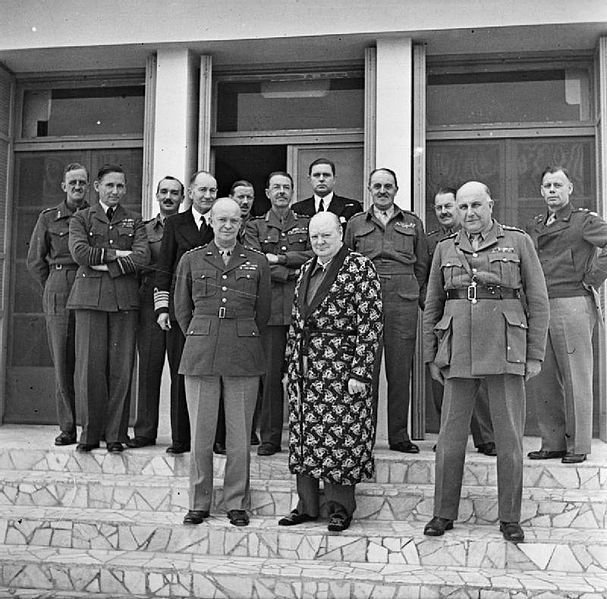
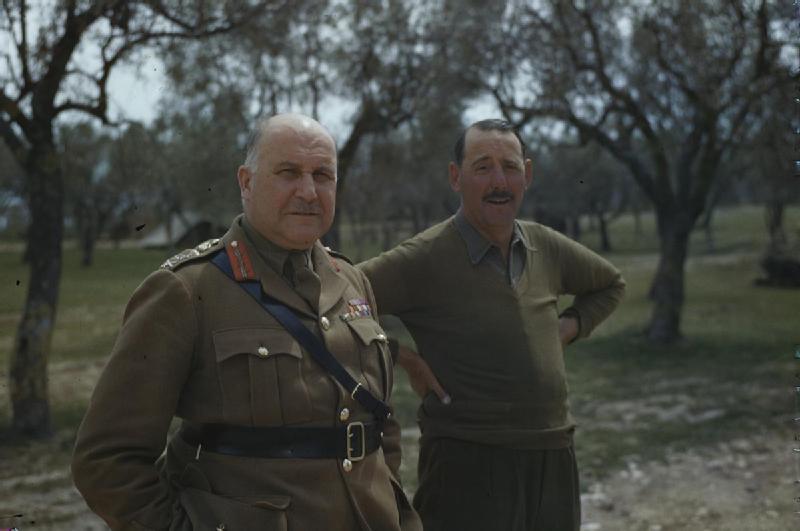
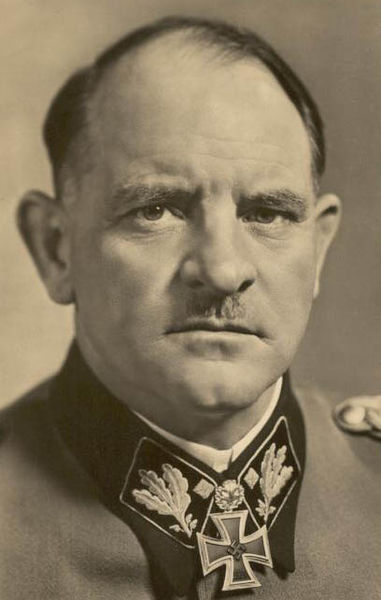
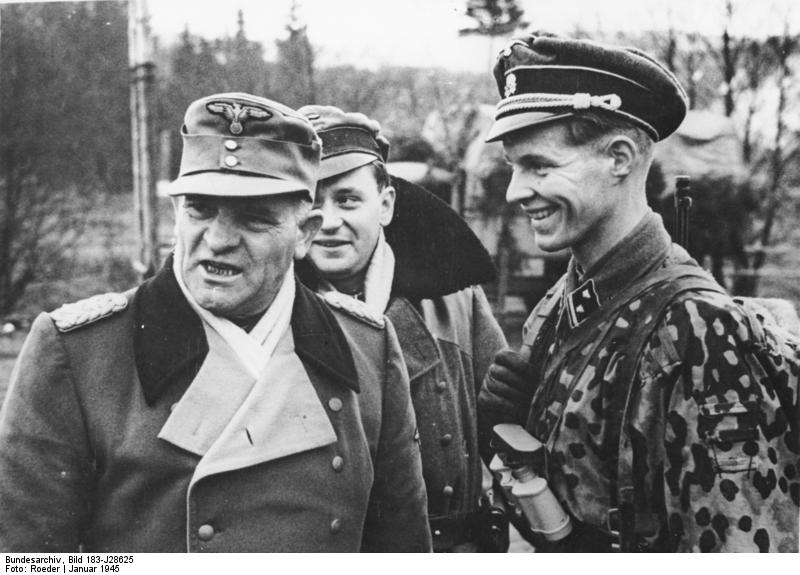
Josef "Sepp" Dietrich (28 May 1892 – 21 April 1966) was a German SS General. He was one of Nazi Germany's most decorated soldiers and commanded formations up to Army level during World War II. Prior to 1929 he was Adolf Hitler's chauffeur and bodyguard but received rapid promotion after his participation in the murder of Hitler's political opponents during the Night of the Long Knives. After the war, he was imprisoned by the United States for war crimes and later by Germany for murder.
Sepp Dietrich was born in Hawangen, near Memmingen in Bavaria, Germany, on 28 May 1892, son of Pelagius Dietrich and his wife Kreszentia. He worked as a butcher and hotel servant. In 1911 he joined the Bavarian Army for a short time. Volunteering at the beginning of the First World War, he served with the artillery, as a paymaster sergeant and later in the first German tank troops.
After the war, Dietrich served briefly in a Freikorps Oberland against the Bavarian Soviet Republic, May 1919. Thereafter, he migrated from one job to another, including waiter, policeman, foreman, farm laborer, petrol station attendant and customs officer. He joined the Nazi Party (NSDAP) in 1928 and became commander of Hitler's Schutzstaffel (SS) bodyguard. His NSDAP number was 89,015 and his SS number was 1,117. Dietrich had been introduced to Nazism by Christian Weber, who was his employer at the Tankstelle - Blau - Bock filling station in Munich. He accompanied Hitler on his tours around Germany. Later Hitler arranged other jobs, including various SS posts, and let him live in the Reich Chancellery.
On 5 January 1930, Dietrich was elected to the Reichstag as a delegate for Lower Bavaria. By 1931, he had become SS - Gruppenführer. When the NSDAP took over in 1933 ("Machtergreifung"), Dietrich rose swiftly through the Nazi hierarchy. He became the commander of Leibstandarte SS Adolf Hitler, General of the Waffen - SS and member of the Prussian state council. As one of Hitler's intimates, Dietrich was often able to disregard his SS superior, Heinrich Himmler, at one time even banning Himmler from the Leibstandarte barracks.
In summer 1934, Dietrich played an active role in the Night of the Long Knives. Hitler told him to take six men and go to the Ministry of Justice to kill a number of Sturmabteilung (SA) leaders. Shortly thereafter, he was promoted to SS - Obergruppenführer. Dietrich's role earned him a nineteen month sentence from a postwar court.
When World War II began, Dietrich led the Leibstandarte in attacks on Paris and Dunkirk during the Westfeldzug (May / June 1940). Dietrich remained in command of the Leibstandarte throughout the campaigns in Greece and Yugoslavia before being promoted to command of the 1st SS Panzer Corps, attached to Army Group Center, on the Eastern Front. In 1943, he was sent to Italy to recover Benito Mussolini's mistress Clara Petacci. He received numerous German military medals but also became notorious for his mistreatment of prisoners of war.
Dietrich commanded the 1st SS Panzer Corps in the Battle of Normandy. He rose to command 5th Panzer Army during the later stages of this campaign. Because of his success, Hitler gave him the command of the newly created 6th Panzer Army. Dietrich commanded it in the Battle of the Bulge (December 1944 - January 1945). He had been assigned to that task because, due to the 20 July Plot, Hitler distrusted Wehrmacht officers. On 17 December, Kampfgruppe Peiper, (an SS unit) under his overall command killed between 77 and 82 U.S. prisoners of war near Malmedy, Belgium, in what is known as the Malmedy massacre. Interestingly, Dietrich was already becoming disillusioned with Hitler's war leadership and is said to have told Field Marshal Erwin Rommel that if he sought a separate peace on the Western Front, he (Dietrich) would support him.
At this point, Dietrich began to protest Hitler's unwillingness to let officers act upon their own initiative. In March 1945, Hitler planned Spring Awakening Offensive. Sepp Dietrich's 6th Panzer Army and the LSSAH spearheaded the offensive. The Germans launched attacks in Hungary near the Lake Balaton area. This area included some of the last oil reserves still available to the Germans. Despite early gains, the offensive was too ambitious in scope and failed. After the failure of the operation the 6th SS Panzer Army (and LSSAH) retreated to the Vienna area. A frustrated Hitler ordered Dietrich to tell members of the LSSAH to give up their cuff titles. Dietrich was disgusted by Hitler's order. Dietrich told SS - Obersturmbannführer Maier that the armbands "...would stay on." Further that the telegram was not to be passed on to the troops. A myth arose that Dietrich ripped off his own cuff titles and those along with a pile of medals were returned in a chamber pot to Hitler; in the same manner as found in the Goethe play Götz von Berlichingen.
The 6th SS Panzer Army desperately prepared defensive positions in Vienna, Austria. The Germans wanted to hold the city against the fast approaching Soviet Red Army in what become known as the Vienna Offensive. The fighting began on 2 April. Vienna finally fell when the last defenders in the city surrendered on 13 April 1945. Thereafter, accompanied by his wife, Dietrich surrendered on 9 May 1945 to Master Sergeant Herbert Kraus of the U.S. 36th Infantry Division at Krems an der Donau north of St. Pölten in Austria.
Dietrich's formal military education was sparse and many critics have said command of an army was beyond his competence. Many of the German army generals looked down upon him in this regard, especially members of the General Staff. However, Dietrich was an acknowledged expert small unit tactician and no one questioned his personal bravery since he was a lead - from - the - front type of commander. The troops that he led appreciated his rough humor and identification with the soldiers on the front lines. Dietrich was also smart enough to appoint highly capable officers to his staff to handle the technical aspects of higher command, leaving him free to exercise overall command.
Dietrich was tried as Defendant No. 11 by U.S. Military Tribunal at Dachau ("United States of America vs. Valentin Bersin et al.", Case No. 6-24), from 16 May 1946 until 16 July 1946. On 16 July 1946, he was sentenced to life imprisonment in the Malmedy massacre trial for ordering the execution of U.S. prisoners of war in Malmedy. Due to testimony in his defense by other German officers, his sentence was shortened to 25 years. He was imprisoned at the U.S. War Criminals Prison No. 1 at Landsberg am Lech in Bavaria. Dietrich served only ten years and was released on parole on 22 October 1955. However, he was rearrested in Ludwigsburg in August 1956. He was charged by the Landgericht München I and tried from 6 May 1957 until 14 May 1957 for his role in the killing of SA leaders (a.k.a. Röhm - Putsch") in 1934. On 14 May 1957, he was sentenced to nineteen months for his part in the Night of the Long Knives and returned to the U.S. military prison at Landsberg. He was released due to a heart condition and circulation problems in his legs on 2 February 1958. By then he had already served almost his entire 19 month sentence. He then settled in Ludwigsburg where he devoted himself to HIAG activities and hunting. Dietrich was sentenced to death in absentia by a Soviet court in connection with war crimes committed by Leibstandarte in Kharkov in 1943.
The post war West German government denied Dietrich any form of a military pension. When his former soldiers learned of his straitened circumstances, thousands of them contributed to a fund which provided their old commander with a comfortable pension.
In 1966 Dietrich died of a heart attack in Ludwigsburg at age 73. Seven thousand of his wartime comrades came to his funeral. He was eulogized by former SS - Obergruppenführer und General der Waffen - SS Wilhelm Bittrich.
Dietrich was married twice. His first wife was Barbra Betti Seidl (b. 24 April 1896). They were married on 17 February 1921 and were divorced in April 1937. On 19 January 1942, Dietrich married Ursula Moninger - Brenner (born 26 March 1915 and died in 1983), a former spouse of SS - Gruppenführer und Generalleutnant der Polizei Karl - Heinrich Brenner. Dietrich and Mrs. Moninger - Brenner had a son, Wolf - Dieter Dietrich, who was born out of wedlock in Karlsruhe in 1939, before Brenner’s divorce was finalized. The two SS generals nonetheless remained friends. A second son, Lutz, was born in Karlsruhe on 20 March 1943, with Heinrich Himmler as the boy's godfather. Dietrich's third son, Götz - Hubertus, was born in Karlsruhe on 23 November 1944; Himmler was again the godfather.